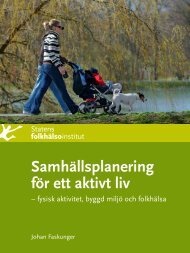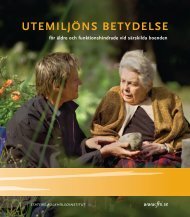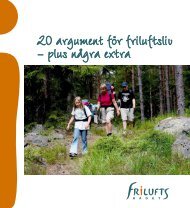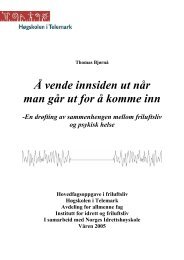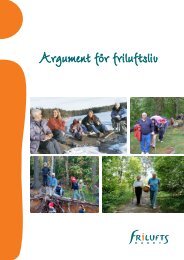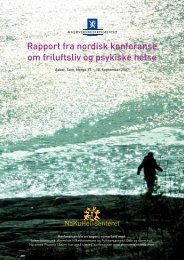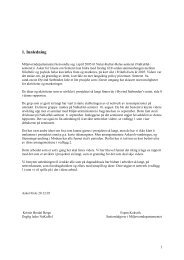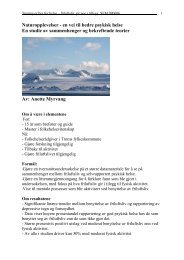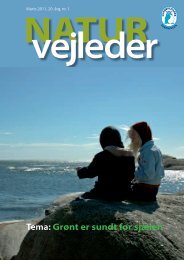Green Care: A Conceptual Framework - Frisk i naturen
Green Care: A Conceptual Framework - Frisk i naturen
Green Care: A Conceptual Framework - Frisk i naturen
You also want an ePaper? Increase the reach of your titles
YUMPU automatically turns print PDFs into web optimized ePapers that Google loves.
More broadly, biophilia is one of a number of psychological constructs that<br />
helps us to understand how people are motivated to interact with nature<br />
and, in the case of green care, gain healing benefit from it.<br />
References<br />
Kellert, S. R., and Wilson, E.O. (eds.) (1993) The Biophilia Hypothesis. Island Press.<br />
Wilson, E. O. (1984) Biophilia. The Human Bond with Other Species, Harvard University Press.<br />
Melson, G. F. (2000) ‘Companion animals and the development of children: Implications of the<br />
Biophilia Hypothesis’, In A. Fine (ed.) Handbook on Animal-Assisted Therapy – Theoretical<br />
Foundations and Guidelines for Practice, 376-383, San Diego: Academic Press, Elsevier Science.<br />
6.3 Attention restoration theory<br />
One theory used in connection with <strong>Green</strong> care, particularly therapeutic<br />
horticulture, is that of Attention Restoration by outdoor environments.<br />
Kaplan and Kaplan (1989) examined the preference for different landscape<br />
images and developed the concept of a ‘restorative environment’ which<br />
plays an important role in recovery from mental fatigue.<br />
They propose that mental fatigue arises as a result of the effort involved<br />
in inhibiting competing influences when attention is directed towards<br />
a specific task. The view or experience of nature which is inherently<br />
interesting or stimulating (i.e. has fascination) invokes involuntary<br />
attention which requires no effort and is therefore restorative. Restorative<br />
experiences have the following components:<br />
Being away is the sense of escape from a part of life that is ordinarily<br />
present and not always preferred. This involves a conceptual change and<br />
not necessarily a physical change.<br />
Fascination is the ability for something to hold attention without effort<br />
thus allowing directed attention to rest. Fascination can be derived from<br />
process – the act of carrying out an activity; or from content – the intrinsic<br />
substance of what is experienced (for example, from the landscape itself).<br />
Extent is the property of an environment that provides the feeling of being<br />
“in a whole other world” that is meaningful and structured.<br />
Compatibility is the affinity of an individual with the environment or<br />
activity so that directed attention is not required in order to engage with it.<br />
73




